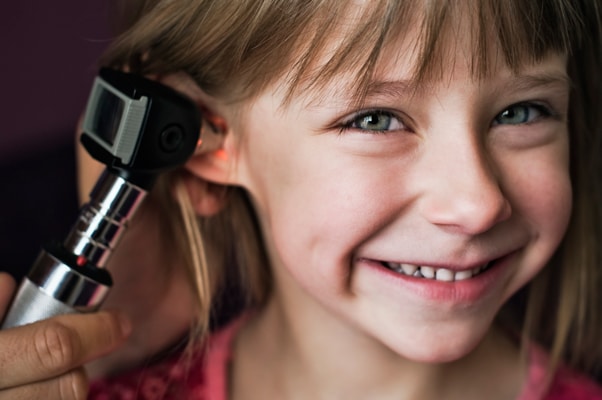A Hearing Loss Specialist Can Assess the Type and Cause of Your Hearing Loss
 For many medical diagnoses, there can be variability in the specific causes as well as any recommended or prescribed treatments. For example, people with diabetes may or may not require insulin, individuals with vision impairment can be near-sighted or far-sighted, and those with hypertension could need prescription medications or be advised to make adjustments in their diets or exercise routines to help reduce their blood pressure levels.
For many medical diagnoses, there can be variability in the specific causes as well as any recommended or prescribed treatments. For example, people with diabetes may or may not require insulin, individuals with vision impairment can be near-sighted or far-sighted, and those with hypertension could need prescription medications or be advised to make adjustments in their diets or exercise routines to help reduce their blood pressure levels.
The same principle holds true for people with hearing loss. Although hearing impairment is the overriding factor, there can be different types of hearing loss based on the nature of the cause/causes, and each type can have various and diverse treatment options too.
When a hearing loss specialist confirms that there is a degree of hearing loss for an adult or a child, it can occur in one (unilateral) or both (bilateral) ears and it will most likely be identified as one of the three types described below in conjunction with their common causes and treatment alternatives respectively:
Sensorineural Hearing Loss – there has been damage to the inner ear (or cochlea) or to the cochlear nerve to the brain. As a result, the transmission of sounds/signals to the brain is inadequate or incomplete.
Sensorineural hearing loss can be attributed to:
- Aging
- Infection
- Noise exposure
- Genetic disorder
- Ototoxic medications
This form/type of hearing loss is often irreversible and is most commonly addressed with hearing aids or treated surgically with cochlear implants.
Conductive Hearing Loss – there is an impediment to the adequate passage of sound through the middle ear to the inner ear. This can lead to a reduction/de-amplification of sound and/or an inability to hear sounds with full clarity.
Conductive hearing loss may result from:
- Accumulation of ear wax
- Damage or trauma to the eardrum
- Malformation of the ear anatomy/structure
- Infections in the middle ear (acute or chronic)
- Otosclerosis (abnormal bone growth in the middle ear)
Treatment options for this type of hearing loss are frequently situational and can include: hearing aids, antibiotics, or surgical intervention (the insertion of tubes and/or aspiration of fluid from behind the eardrum).
Mixed Hearing Loss – includes simultaneous hearing loss in the inner and middle ear; in other words, it has the combined effects of sensorineural hearing loss and conductive hearing loss. In terms of treatment, the conductive issue or issues are prioritized.
If an individual suspects that he/she, or a family member, is experiencing some form of hearing loss as described above, it would be prudent to book a visit to a hearing clinic, like Bravo Hearing Centre in Toronto, at their earliest convenience to meet and consult with a hearing loss specialist on the possible causes and potential courses of treatment.
What Is The Difference Between Hearing Loss & Deafness?
Even if your hearing is impaired, many people can still hear well enough to participate in conversations. Hearing aids or other therapies can help enhance your hearing capacity.
Deaf people can only hear a few words, and sometimes nothing at all. Hearing aids and devices are ineffective for them, and they converse through sign language.
Levels of Hearing Loss
Hearing loss occurs across many levels measured across a decibel range. The decibels refer to the loudness of the sound being made. If you can only hear sounds once they are at or above a certain decibel, you would be classified as having that degree of hearing loss.
For example, normal hearing means you can hear any sound between 10 and 15 decibels. If the sound needed to be 45 decibels before you could hear it, that would be considered moderate hearing loss, while you would be considered to have profound hearing loss if the sound needed to be above 91 decibels.
| Severity of Hearing Loss | Decibel Range | Common Sound in This Range |
| Normal | 10-15 | Regular breathing |
| Slight | 16-25 | Whispering nearby |
| Mild | 26-40 | Sounds in a library |
| Moderate | 41-55 | A refrigerator |
| Moderately Severe | 56-70 | Regular conversation |
| Severe | 71-90 | An alarm clock |
| Profound | 91+ | A car horn |
Signs That Indicate a Noise is Too Loud
There are often many sounds occurring around us, and it can be hard to tell if they are too loud and may be damaging to your hearing. Any sound above 70 decibels can be damaging for long-term listening and can lead to hearing loss, while a sound over 140 decibels can cause damage after one exposure. These signs indicate that you should find somewhere quieter:
- Needing to talk loudly to be heard.
- Being unable to easily understand someone talking within 3 feet of you.
- Other sounds seem muffled once you go to a quieter area.
- Your ears are painful or ring after being around the loud noise.
How is Hearing Loss Diagnosed?
Your hearing loss specialist will inquire about your symptoms and perform a physical examination. They look for infection or other problems that could lead to hearing loss.
They will then perform a test to determine which noises you are capable of hearing, how well you differentiate high/low-pitched sounds, and the degree and type of hearing deficiency.
A Hearing Aid Specialist Can Determine the Best Type of Device for Your Needs

The hearing aid specialists at Bravo Hearing Centre wholly understand the concerns and frustrations that may be associated with hearing loss. And they also realize the lifestyle benefits that may be restored, or the limitations that may be overcome, through the use of hearing aids.
Should it be determined that hearing aids are the best option/course of treatment for an individual with hearing impairment, a hearing aid specialist from Bravo Hearing Centre in Toronto can share their professional knowledge and insight on the type of device/devices to best meet a patient’s specific and individual needs. Based on these needs, as well as on any personal preferences, hearing aid options can include:
- In-The-Ear (ITE)
- In-The-Canal (ITC)
- Behind-The-Ear (BTE)
- Invisible-In-Canal (IIC)
- Receiver-In-Canal (RIC)
- Completely-In-Canal (CIC)
If you or a family member is experiencing hearing loss, book a visit to our hearing clinic as soon as possible to determine the type and cause of the impairment and to discuss potential treatment options. Call the hearing aid specialists from Bravo Hearing Centre in Toronto at 416-207-9711 to schedule your appointment today.
Also Read:


